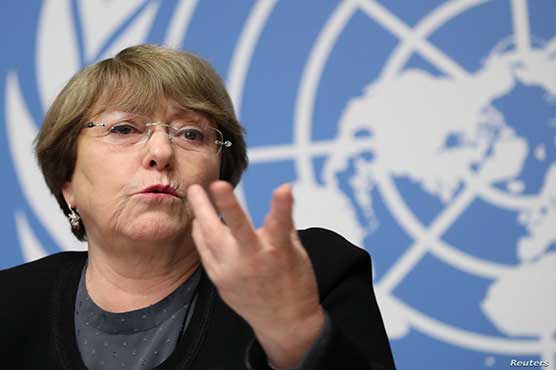Coronavirus lays bare divisions in society: UN rights chief

Bachelet hailed the recent dramatic advances in vaccine developments against Covid-19
GENEVA (AFP) - The UN human rights chief warned Wednesday that the coronavirus crisis had laid bare serious weaknesses and divisions within societies, including a destructive failure to respect basic rights.
"Covid-19 has zeroed in on the fissures and fragilities in our societies, exposing all our failures to invest in building fair and equitable societies," Michelle Bachelet said.
During an annual end-of-year briefing in Geneva, she voiced deep concern about a range of rights situations in the world, from Ethiopia to Hong Kong and France.
But she especially voiced alarm at politicisation of Covid-19, the disease that has claimed more than 1.5 million lives in less than a year, and stressed that the crisis had revealed the inequalities and rights abuses that were permitted to flourish before the pandemic struck.
Bachelet hailed the recent dramatic advances in vaccine developments against Covid-19, but lamented that the world had long ignored existing "vaccines" against ills like poverty, inequality and even climate change.
"The name of that vaccine is human rights," she said.
"Covid-19 has shone a stark spotlight on our failure to uphold those rights to the best of our ability, not just because we couldn t, but because we neglected to, or chose not to."
Bachelet said that a number of governments had failed to act quickly and decisively enough to halt the spread of the virus, while others refused to take it seriously, or were not transparent about its spread.
Utterly reprehensible
"Astoundingly, even to this day, some political leaders are still playing down its impact, disparaging the use of simple measures such as wearing masks and avoiding large gatherings," she said.
"Politicising a pandemic in this way is beyond irresponsible -- it is utterly reprehensible," she said.
When pressed, she voiced sadness that politicisation of the crisis appeared to have driven sky-high numbers of cases and deaths in the world s two hardest-hit countries, the United States and Brazil.
"In any country of the world where leaders have denied the existence of Covid, and the scientific evidence of Covid, there has been devastating effect," she said.
"Conspiracy theories and disinformation have been sown and allowed -- or encouraged -- to thrive.
"These actions have plunged a knife into the heart of that most precious commodity: trust."
But in the case of the United States, Bachelet said she was "really hopeful" that incoming president Joe Biden would change the course in the country in terms of addressing the pandemic and also promoting respect for human rights in general.
"For human rights I think it will be much better," she said.
Asked about specific country situations, the UN High Commissioner for Human Rights spoke about her concerns over the "rapidly shrinking civic and democratic space" in Hong Kong after the passage of a draconian new national security law.
And she voiced alarm at the conflict in Ethiopia, warning it was "spiralling out of control" with an "appalling impact on civilians."
When asked about police violence and a controversial security bill in France, she said she urged "France, as I urge many other countries, to seriously examine its law enforcement practices."
It was vital, she said, to stem "discriminatory practices and bias against certain racial groups," urging authorities to ensure that entire "groups are not stigmatised or have their rights violated."

